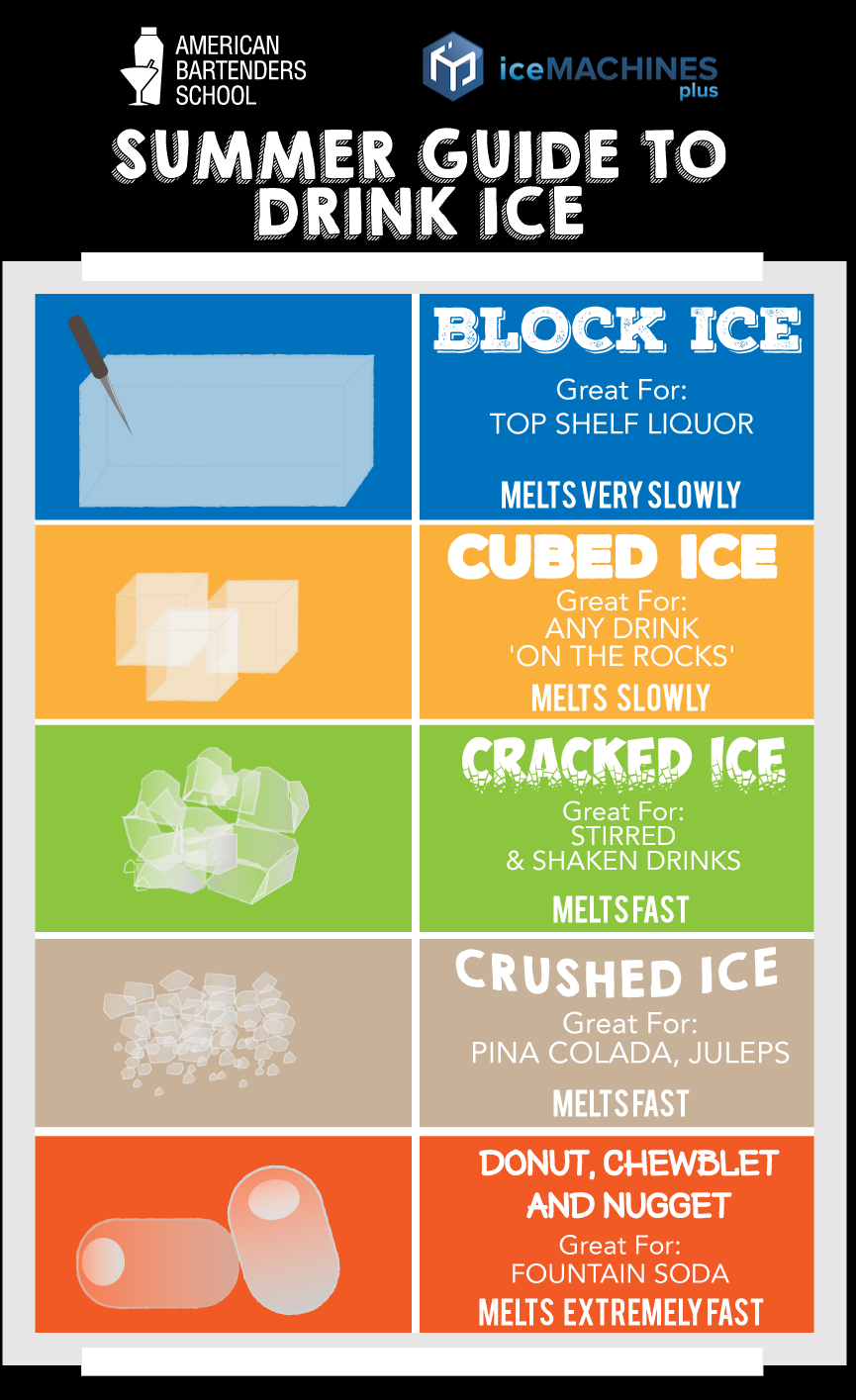So, does the type of ice really make a difference in your cocktails? We asked our friends from IceMachinesPlus to help us out with this one.
With their help, we also came up with a Summer Guide to Drink Ice!
Ice to a bartender is like fire to a chef. It is vital for making good cocktails. A bartender must know about why ice is used in drinks and what the different properties of different kinds of ice are. It’s not a simple as just going to a machine and plunking some cubes in!
What Ice Does
Ice has three main functions in cocktails. The first is to make the drink colder. The second is to add water to a strong drink. The third is to provide an aesthetic element to the experience. The art of cocktails didn’t really take off until bartenders could get their hands on large amounts of ice. However, cold needs to be balanced with dilution and that’s where it gets tricky.
Dilution
As ice cools down, it melts. This adds water to your drink, which can be a good thing or a bad thing. Some alcohols do benefit from a little water. It can volatize flavor compounds that enrich the experience. It’s why some scotch drinkers splash their drink with water before drinking it straight. Too much water, however, will make a drink taste too weak. The basic rules are these:
- In general, the more ice you have by mass in a container, the faster it will chill.
- A piece of ice with less surface area will melt faster than one with a larger surface area. However, if the piece of ice is heavier and more pure, this will slow melting compared to a piece of ice of equal size.
- Manipulating the ice by shaking or stirring the drink will make it melt and chill faster.
- For drinks that are meant to be enjoyed over time, use heavier and larger pieces, and vice versa for drink for immediate consumption.
Where is the balance point? It all depends on the drink, and that’s where skill and experience come into play along with the right kind of ice. There are four main kinds of ice used in bars: block ice, cube ice, cracked ice, and crushed ice.
Block ice
The old fashioned way of making smaller ice is by using a big block and a pick. Ice machines do most of the heavy lifting these days but some bartenders stick to the old ways to make dense large pieces of ice. Block ice is also necessary to make ice spheres, which are getting quite popular in some areas. This type of ice is the heaviest and the slowest-melting, which makes it great for top-shelf liquor that a patron might savor for a long time or for a large punch bowl.
Cube ice
The next step down, and the classic shape for cocktails, is cube ice. Any drink “on the rocks” is going to use cube ice or some form of block ice. Cube ice melts slowly and keeps drinks mildly cold compared to other ice types. Most bars will use standard cubes rather than fancy shapes like doughnut ice, nugget ice or chewblet (“Sonic style”) ice. These ice types were made for the soft drink industry for very rapid cooling of sodas and for people who like to chew ice. People usually don’t drink their sodas slow, so they melt very fast. That’s why your soda tastes terrible by the time you get your drink home from the drive-thru.
Cracked ice
The next step down is cracked ice. This is used in stirred and shaken drinks. The primary purpose of it is for rapid cooling. However, it melts fast. Thus, the trick for the bartender is to shake or stir the drink long enough to reach the right temperature without adding too much water into the mix. This takes practice and a lot of taste-testing.
Crushed ice
At the smallest level is crushed ice, which is similar to the ice you get from a snow cone. It melts very fast but makes drinks very cold. Juleps, pina coladas, and many other beach drinks use crushed ice. Try cracking some cubes in a tea towel and home and shake those compared to standard ice cubes. You’ll start to see just how much ice can change the effect of a drink. Enjoy your experiments and drink responsibly!
Author Mark is from IceMachinesPlus.com with over 10 years of experience in the restaurant and bar industry. With an extensive background and entertaining writing style Mark is focused on providing quality information and advice to managers and contractors about the best practices on choosing the right type of ice machine.


